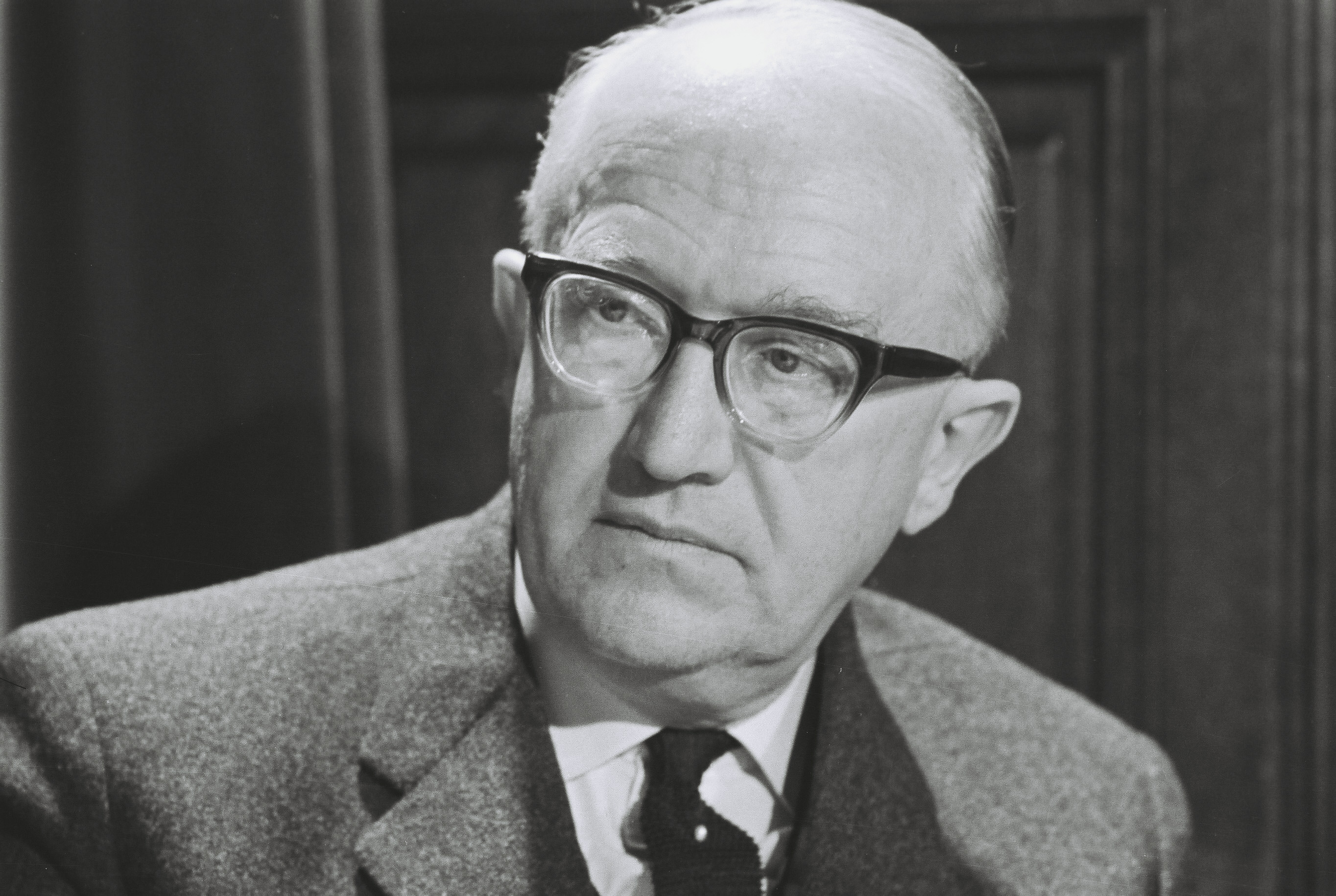- Walter Hallstein
Infobox_President | name =Walter Hallstein
nationality =German

order =1stPresident of the European Commission
term_start =1958
term_end =1967
vicepresident =
predecessor =None
successor =Jean Rey
birth_date =birth date|1901|11|17|df=y
birth_place =Mainz ,Germany
death_date =death date and age|1982|3|29|1901|11|17|df=y
death_place =Stuttgart ,Germany
party =Christian Democratic Union
spouse =
religion =
order2 =
term_start2 =
term_end2 =
president =
predecessor2 =
successor2 =|Walter Hallstein (
17 November 1901 –29 March 1982 ) was a Germanpolitician and professor.He was one of the key figures of
Europe an integration afterWorld War II , becoming the first president of the Commission of the European Economic Community. His name is associated with the "Hallstein Doctrine ", by which the Federal Republic of Germany (West Germany ) attempted to block the recognition of theGerman Democratic Republic (East Germany), thePeople's Republic of Poland and other communist states.Biography
Early life
Hallstein was born in
Mainz , Germany, the son of a government building officercite web | url = http://www.dhm.de/lemo/html/biografien/HallsteinWalter/ | title=Walter Hallstein| accessdate = 2007-11-11 | publisher = German Historical Museum | language = German ] . He studiedlaw inBonn ,Munich andBerlin and graduated in 1925 with a doctoraldissertation on the provisions of theTreaty of Versailles with regard toinsurance policies. From 1926 he worked at theKaiser Wilhelm Institute for Foreign Private and International Private Law inBerlin . In 1930, at the age of 28, he was appointedprofessor for private law and company law at theUniversity of Rostock (Rostock ), where he remained until 1941. In 1941 he was appointed professor of civil law at the University of Frankfurt (Frankfurt am Main ). He was also, at the same time, director of the university's Institute for Comparative Law and Commercial Law.Military service
From 1942 he served in the
Wehrmacht , serving as afirst lieutenant ("Oberleutnant") in NorthernFrance . He was taken prisoner in 1944. While in aprisoner-of-war camp inMississippi (1944–1946), he started a "camp university", where he heldlaw courses for the prisoners.Post-war academic career
In 1946 he returned to Frankfurt University, where he was elected rector of the university. From 1948 he spent a year in the
United States as guest professor atGeorgetown University (Washington DC ), teaching International Relations.Political career in Germany
In June 1951 the German
Chancellor ,Konrad Adenauer , appointed him state secretary (a top-ranking civil servant) in the Federal Chancellery ("Kanzleramt") and made him head of the German delegation for the Schuman Plan negotiations. A few months later he was made state secretary at the foreign ministry. In September 1955 he was responsible for the policy that bears his name, theHallstein Doctrine , though much of the work formulating this is said to have actually been done by his deputyWilhelm Grewe .Hallstein remained at the foreign ministry until the beginning of 1958 and played a major part in the negotiations on the
European Economic Community andEuratom treaties. In 1955, he was one of the participants of theMessina Conference in 1955, which would lead to theTreaty of Rome in 1957.President of the Commission of the European Economic Community
On
January 7 ,1958 Hallstein was appointed first president of the Commission of the European Economic Community (now theEuropean Commission ) inBrussels , a post he was to retain until 1967.In 1961 he was awarded the
Charlemagne prize (Karlspreis ) by the City ofAachen for his efforts in the cause of European federation.As a proponent of a federal Europe with a strong Commission and
Parliament , he was opposed to de Gaulle's vision of a "Europe des États" (Europe of States) with more power retained by national governments, and in September 1967 he was forced to resign as president of the Commission.Later life
From 1967 onward, he wrote and was active in German politics. From 1969 to 1972 he was a member of the "
Bundestag " (the lower house of the German federal parliament) for the CDU.From 1968 to 1974 he was president of the council of the
European Movement .Im 1968, he was awarded the
Robert Schuman Prize .He died in
Stuttgart onMarch 29 ,1982 , at the age of 80.Honours
During his lifetime Walter Hallstein received honorary doctorates from nine European and nine American universities, including the universities of Hamburg, Padua, Columbia, Georgetown, and Harvard.
In 1961 he was awarded the
Charlemagne prize (Karlspreis ) by the City ofAachen for his efforts in the cause of European federation.In 1997, the [http://www.whi-berlin.de Walter Hallstein Institute for European Constitutional Law] at the
Humboldt University inBerlin was named in his honour.The
Walter Hallstein Prize is awarded annually in November by theJohann Wolfgang Goethe University of Frankfurt am Main , the town of Frankfurt am Main and theDresdner Bank for special services to European integration.References
Further reading
*
* cite book|title=Walter Hallstein: The Forgotten European?|last=Loth|first=Wilfried|coauthors=Wallace, William; Wessels, Wolfgang
publisher=St. Martin's Press|location=New York|date=1998|isbn=978-031221293-3External links
Biographical details
* [http://europa.eu/abc/history/index_en.htm The History of the European Union: A chronology from 1946 to 2003]
* [http://www.touteleurope.fr/fr/union-europeenne/ue-au-fil-du-temps/les-personnages-cles/walter-hallstein-1901-1982.html Biography of Walter Hallstein at a semi-official French web site]
* [http://www.kas.de/wf/de/71.4765/ Biography of Walter Hallstein at the Konrad-Adenauer Foundation]
* [http://www.karlspreis.de/portrait/1961.html Brief portrait of Walter Hallstein at the official web site for Charlemagne Prize awards]Institutions
* [http://www1.kas.de/stiftung/englisch/intro.html Konrad-Adenauer Foundation]
* [http://www.whi-berlin.de/ Walter Hallstein Institute]
* [http://www.karlspreis.de/ Charlemagne prize foundation; includes a list of recipients]
Wikimedia Foundation. 2010.
